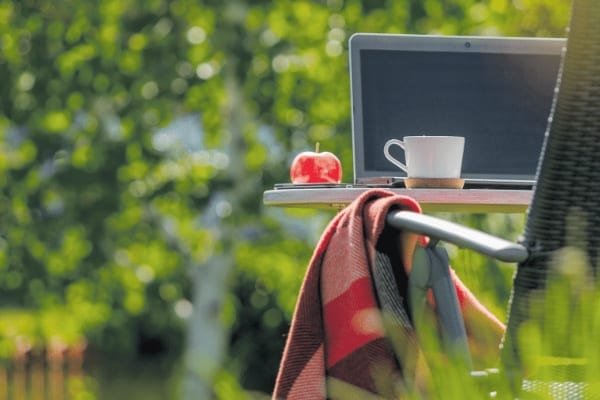‘It’s clear that by using digital virtualisation and workspace technologies to empower flexible and remote work models, companies can positively impact sustainability.’
TIM MINAHAN
Executive vice president of Citrix
Balance and wellbeing
Numerous studies have shown that remote working can have a positive impact on productivity, performance and retention. For many of us, this shifting paradigm in work patterns has reinforced the notion that work is not a place you go, but something you do.
A study produced by CEBR found that by reducing commuting hours and consolidating offices through sustainable I.T. practices, remote work could help reduce annual CO2 emissions by 214 million tonnes.
Despite this, the importance of face-to-face interaction in business contexts has not diminished. We can’t all work remotely, and for those who can, it may not be a full-time solution. Balance is key but with the right strategy – underpinned by the right technology platform – we can significantly reduce emissions while improving an individual’s work-life balance and wellbeing.
Green clouds
8 million on-premises data centres consume 3% of global electricity – and 40% of data centres are energy inefficient, incurring unnecessary expense and significantly contributing to I.T.’s energy and emissions.
Carbon-zero cloud computing allows for delivery from an energy-efficient data centre, and ‘hyperscale’ service providers are increasingly using renewable energy to reduce carbon emissions.
Transitioning from data centres to hyperscale-hosted cloud services can help to reduce your environmental impact. AWS customers need only 16% of the power of an on-premise infrastructure while Azure (powered by 70% renewable energy) is 44% more efficient than the average on-premise data centre.
Hosted desktops
While hyperscalers have driven efficiencies and flexibility to a new level, considerations around cost, management, complexity, the sovereignty of data and the need for on-premise resources mean a wholesale migration to a hyperscaler is not necessarily the right move for all organisations.
A hosted desktop solution using products such as Citrix and Microsoft Virtual Desktop may provide a better solution thanks to the power savings, manageability, performance and security enhancements.
With a correctly deployed and energy-efficient hosted desktop solution in place, end-user device security is easier to manage as the information displayed on the device is securely held in the data centre; only screen and keyboard requests are transmitted from the device.
Extend the life of a device
The sustainability benefits of a hosted desktop environment can also extend the effective lifecycle of the desktop PC. It is estimated that around 50% of the total whole-life emissions of a PC relate to manufacturing and distribution. Therefore, extending the effective life of a PC and monitor has a significant and positive overall impact on the carbon footprint of your end-user device estate.
Technology offered by Citrix allows students to remotely access the processing power of high-power graphics workstations on campus from virtually any end-user device.
Organisations in the healthcare and local government sectors have both financial and logistical challenges to manage as Windows 7 operating reached the end of its support lifecycle earlier this year. This virtual approach can be used to deliver a secure and supported Windows desktop on equipment that would otherwise be discarded.
Although not as efficient as a thin client device, using a compatible browser or a simple installed piece of software, a functioning but unsupported Windows 7 PC can deliver a virtual Windows 10 desktop – even though the memory and supported operating system to process it locally are absent from the device.
Microsoft and Citrix
Earlier this year, Microsoft and Citrix strengthened their long-standing partnership by announcing a multi-year agreement in which Microsoft will promote Citrix Workspace as a preferred digital workspace solution for the ‘future of work’.
Citrix will use Microsoft Azure as its preferred cloud services provider, moving existing on-premises Citrix customers to Microsoft Azure and enabling users to work from anywhere across multiple devices.
Build a sustainable I.T. model
In broad terms, if you are looking for the most carbon-efficient means of delivering I.T. to your business, you need to minimise commuting and business travel by architecting for remote working, address energy-inefficient data centres and switch to more energy-efficient devices.
In order to achieve this, you need to consider cloud (or hybrid cloud) and workspace as part of your I.T. strategy.
It is important for businesses to understand where they are on this journey – which constraints exist and how to deliver a strategy that not only enhances the user experience but also has a positive impact on business as usual. If you need a helping hand to guide you on the pathway to achieving sustainable I.T., Cetus will take you on that journey and will act as your guiding star.
 Play Video about This Rock Might Just Save The World
Play Video about This Rock Might Just Save The World Play Video about Play 2 hours of rock
Play Video about Play 2 hours of rock Play Video about Play 2 hours of brook
Play Video about Play 2 hours of brook Play Video about Play 2 hours of sheep
Play Video about Play 2 hours of sheep











































